|
Di seguito gli interventi pubblicati in questa sezione, in ordine cronologico.
This is a scalable context timeline. It contains events related to the event 1991-1997: Oil Investment in Central Asia Follows Soviet Collapse. You can narrow or broaden the context of this timeline by adjusting the zoom level. The lower the scale, the more relevant the items on average will be, while the higher the scale, the less relevant the items, on average, will be.

1991-1997: Oil Investment in Central Asia Follows Soviet Collapse
The Soviet Union collapses in 1991, creating several new nations in Central Asia. Major US oil companies, including ExxonMobil, Texaco, Unocal, BP Amoco, Shell, and Enron, directly invest billions in these Central Asian nations, bribing heads of state to secure equity rights in the huge oil reserves in these regions. The oil companies commit to $35 billion in future direct investments in Kazakhstan. It is believed at the time that these oil fields will have an estimated $6 trillion potential value. US companies own approximately 75 percent of the rights. These companies, however, face the problem of having to pay exorbitant prices to Russia for use of the Russian pipelines to get the oil out. [NEW YORKER, 7/9/2001; ASIA TIMES, 1/26/2002]
December 11, 1994: Russia Invades Breakaway Region of Chechnya, Starting First Chechen War

A Chechen rebel looks at the government palace in Grozny, Chechnya, in January 1995. [Source: Mikhail Evstafiev]
In 1991, with the collapse of the Soviet Union, Dzhokhar Dudayev won an election in Chechnya, which is a region within Russia and not a republic like Ukraine or Kazakhstan. Nonetheless, Dudayev proclaimed Chechnya independent of Russia. The next year, Chechyna adopted a constitution defining it as an independent, secular state. But Russia did not recognize Chechnya’s independence. In November 1994, Russia attempted to stage a coup in Chechnya, but this effort failed. The next month, on December 11, Russian troops invade Chechnya. This starts the first Chechen war. Up to 100,000 people are killed in the 20-month war that follows. The war will end in August 1996 (see August 1996). [BBC, 3/16/2000; BBC, 3/12/2008]
August 1997: CIA Monitors Central Asia for Oil Reserves
The CIA creates a secret task force to monitor Central Asia’s politics and gauge its wealth. Covert CIA officers, some well-trained petroleum engineers, travel through southern Russia, Azerbaijan, Kazakhstan, and Turkmenistan to sniff out potential oil reserves. [TIME, 5/4/1998]
Fall 2002-January 2003: US State Departments and Former Oil Executives Plan Iraq’s Post-Invasion Oil Industry
The Bush administration picks Philip Carroll, a former CEO of Royal Dutch/Shell’s US division, to advise post-Saddam Iraq’s oil ministry. [HARPER'S, 4/2005, PP. 74-76] He is formally appointed in January 2003 along with Gary Vogler of ExxonMobil, three employees of the US Department of Energy, and an employee of the Australian government. In the months before the invasion, they are sent to Kuwait where they “begin planning for the restructuring of the ministry of oil to improve its efficiency and effectiveness [and] begin thinking through Iraq’s strategy options for significantly increasing its production capacity,” Carroll later explains. [MUTTITT, 2005]
May 28, 2006: Baku-Tbilisi-Ceyhan Oil Pipeline Opens
The first oil pumped from Baku, by the Caspian Sea in Azerbaijan, arrives in Ceyhan, on Turkey’s Mediterranean coast, and is loaded onto a ship. The 1,770 km pipeline, which passes through the Georgian capital of Tbilisi, bypasses Russia and Iran for geopolitical reasons. The main shareholder is British Petroleum, and other significant shareholders include the State Oil Company of Azerbaijan (SOCAR), Statoil of Norway, and the US company Unocal, which has an 8.9% interest and became interested in the project no later than 1998. Unocal begins losing interest in a pipeline across Afghanistan around the same time (see December 5, 1998). Substantial amounts to finance the $3-4 billion Baku-Tbilisi-Ceyhan (BTC) pipeline were arranged by the World Bank’s International Finance Corporation and the European Bank for Reconstruction and Development. The consortium members put up the remaining 30%. [US CONGRESS, 2/12/1998; ALEXANDER'S GAS AND OIL CONNECTIONS, 7/12/2002; GUARDIAN, 12/1/2003; GUARDIAN, 5/26/2005; EURASIA DAILY MONITOR, 5/31/2005; TURKISH WEEKLY, 5/29/2006] Journalist Pepe Escobar comments: “In terms of no-holds-barred power politics and oil geopolitics, BTC is the real deal—a key component in the US’s overall strategy of wrestling the Caucasus and Central Asia away from Russia—and bypassing Iranian oil and gas routes… BTC makes little sense in economic terms. Oil experts know that the most cost-effective routes from the Caspian would be south through Iran or north through Russia. But BTC is a designer masterpiece of power politics—from the point of view of Washington and its corporate allies. US Vice President Dick Cheney, already in his previous incarnation as Halliburton chief, has always been a huge cheerleader for the ‘strategically significant’ BTC.” Escobar also mentions that the amount of Caspian oil was overestimated (see November 1, 2002), “the Caspian may hold only 32 billion barrels of oil—not much more than the reserves of Qatar, a small Gulf producer.” [ASIA TIMES, 5/26/2005] However, the Caspian area is still believed to hold considerable amounts of natural gas. The construction of this pipeline does not halt plans for the construction of a natural gas pipeline from Turkmenistan across Afghanistan to the Indian Ocean (see January 18, 2005).
Source: historycommons.org
While this article is not focused on the recreational use of cannabis, Terence McKenna's quote speaks directly to a sacred right, increasingly being legislated against in our society, namely, the ability to choose and use substances that grow freely on this Earth as our medicine.
In a day and age where possession of an herb like cannabis is an offense punishable by incarceration, it is important for us to reflect on how we arrived at this dark point in time.

Herbs, after all, were put here by God. If you prefer the word Nature, the point is the same, and it was put best by Bob Marley when he said: "you can't tell God it [cannabis] is illegal."
And yet authorities are telling God, and you and me, that it is illegal, despite a growing body of scientific evidence that it has profound potential as a medicine. Does this not in some way call into question the very legitimacy and authority of those who would lay claim to the right to decide what a human can or can not use a natural substance to improve their health, or enliven their spirit? As long as no harm is being done to others in the act of choosing what is best for oneself, who can rightfully take issue with the freedom to choose one's own "medicine"?
Were it not for the fact that the human body is hard-wired to respond to cannabis through the endocannabinoid system (ES), claims for its medicinal value would have much less weight. The ES, in fact, encompasses a wide range of physiological processes, including appetite, pain sensation, mood and memory. So fundamental are these processes to what motivates and defines human behavior, it is no wonder that a plant with the power to directly affect these functions would be the subject of such profound controversy, as well as brutal, socioeconomic and politically-mediated criminalization.

Indeed, the endocannabinoid system mediates the psychoactive effects of cannabis associated with its "highs" and sometimes "lows." Any plant with the power to alleviate pain or illness and which grows freely in the wild represents a significant threat to a conventional medical establishment whose monopoly is founded on the coining of medicines from patented and proprietary chemicals.
Cannabis, however, is not a Johnny-come-lately to the fierce debate over whether traditional herbal medicines have proven safety and efficacy within the "evidence-based" model of medicine. In fact, few plants can lay claim to as much scientific, and particularly human clinical data supporting its right to exist alongside other prescribed medicines as a viable treatment option. Indeed, the GreenMedInfo.com project has uncovered 129 distinct disease categories that may benefit from this remarkable plant thus far, and new studies are being added on a weekly basis.
Given the glut of research establishing the likelihood of a legitimate medicinal role for the plant in human disease prevention and treatment, the tides are beginning to turn against the miseducation of the public about this valuable herb. The fate of the practice of traditional herbalism itself, and our health freedom as a whole, hinges, in many respects, on whether the pharmaceutically-driven medical establishment, and the drug conviction-dependent privatized-prison industrial complex succeeds in maintaining the media-articulated stranglehold on mainstream opinion. We hope the positive cannabis science will arm those advocating for health freedom with the truth, and ask that you distribute it widely to those who are receptive to rational, science-based discourse on this herb's benefits.
Possessing and using any herb, but especially one that has such a high level of safety, should be the choice of that free adult, and not grounds for the termination of their constitutional and human rights associated with arrest and imprisonment, which in this day and age is equivalent to enslavement and torture.
Sayer Ji is the founder and director of GreenMedInfo.com and co-author of the book The Cancer Killers: The Cause Is The Cure with New York Times best-seller Dr. Ben Lerner and Dr. Charles Majors. His writings and research have been published in the Wellbeing Journal, the Journal of Gluten Sensitivity, and have been featured on Mercola.com, NaturalNews.com, Reuters.com, GaryNull.com, and Care2.com. Check out his newest project: Dr. Gourmet.
Disclaimer: This article is not intended to provide medical advice, diagnosis or treatment. Views expressed here do not necessarily reflect those of GreenMedInfo or its staff.
"If the words "life, liberty and the pursuit of happiness" don't include the right to experiment with your own consciousness, then the Declaration of Independence isn't worth the hemp it was written on."
- Terence McKenna
Source: greenmedinfo.com
This article was amended on 18 March 2011 to remove references to Facebook and Twitter, introduced during the editing process, and to add a comment from Centcom, received after publication, that it is not targeting those sites.

The US military is developing software that will let it secretly manipulate social media sites by using fake online personas to influence internet conversations and spread pro-American propaganda.
A Californian corporation has been awarded a contract with United States Central Command (Centcom), which oversees US armed operations in the Middle East and Central Asia, to develop what is described as an "online persona management service" that will allow one US serviceman or woman to control up to 10 separate identities based all over the world.

The project has been likened by web experts to China's attempts to control and restrict free speech on the internet. Critics are likely to complain that it will allow the US military to create a false consensus in online conversations, crowd out unwelcome opinions and smother commentaries or reports that do not correspond with its own objectives.
The discovery that the US military is developing false online personalities – known to users of social media as "sock puppets" – could also encourage other governments, private companies and non-government organisations to do the same.
The Centcom contract stipulates that each fake online persona must have a convincing background, history and supporting details, and that up to 50 US-based controllers should be able to operate false identities from their workstations "without fear of being discovered by sophisticated adversaries".
Centcom spokesman Commander Bill Speaks said: "The technology supports classified blogging activities on foreign-language websites to enable Centcom to counter violent extremist and enemy propaganda outside the US."
He said none of the interventions would be in English, as it would be unlawful to "address US audiences" with such technology, and any English-language use of social media by Centcom was always clearly attributed. The languages in which the interventions are conducted include Arabic, Farsi, Urdu and Pashto.
Centcom said it was not targeting any US-based web sites, in English or any other language, and specifically said it was not targeting Facebook or Twitter.

Gen David Petraeus has previously said US online psychological operations are aimed at 'countering extremist ideology and propaganda'. Photograph: Cliff Owen/AP
Once developed, the software could allow US service personnel, working around the clock in one location, to respond to emerging online conversations with any number of co-ordinated messages, blogposts, chatroom posts and other interventions. Details of the contract suggest this location would be MacDill air force base near Tampa, Florida, home of US Special Operations Command.
Centcom's contract requires for each controller the provision of one "virtual private server" located in the United States and others appearing to be outside the US to give the impression the fake personas are real people located in different parts of the world.
It also calls for "traffic mixing", blending the persona controllers' internet usage with the usage of people outside Centcom in a manner that must offer "excellent cover and powerful deniability".
The multiple persona contract is thought to have been awarded as part of a programme called Operation Earnest Voice (OEV), which was first developed in Iraq as a psychological warfare weapon against the online presence of al-Qaida supporters and others ranged against coalition forces. Since then, OEV is reported to have expanded into a $200m programme and is thought to have been used against jihadists across Pakistan, Afghanistan and the Middle East.
OEV is seen by senior US commanders as a vital counter-terrorism and counter-radicalisation programme. In evidence to the US Senate's armed services committee last year, General David Petraeus, then commander of Centcom, described the operation as an effort to "counter extremist ideology and propaganda and to ensure that credible voices in the region are heard". He said the US military's objective was to be "first with the truth".
This month Petraeus's successor, General James Mattis, told the same committee that OEV "supports all activities associated with degrading the enemy narrative, including web engagement and web-based product distribution capabilities".
Centcom confirmed that the $2.76m contract was awarded to Ntrepid, a newly formed corporation registered in Los Angeles. It would not disclose whether the multiple persona project is already in operation or discuss any related contracts.
Nobody was available for comment at Ntrepid.
In his evidence to the Senate committee, Gen Mattis said: "OEV seeks to disrupt recruitment and training of suicide bombers; deny safe havens for our adversaries; and counter extremist ideology and propaganda." He added that Centcom was working with "our coalition partners" to develop new techniques and tactics the US could use "to counter the adversary in the cyber domain".
According to a report by the inspector general of the US defence department in Iraq, OEV was managed by the multinational forces rather than Centcom.
Asked whether any UK military personnel had been involved in OEV, Britain's Ministry of Defence said it could find "no evidence". The MoD refused to say whether it had been involved in the development of persona management programmes, saying: "We don't comment on cyber capability."
OEV was discussed last year at a gathering of electronic warfare specialists in Washington DC, where a senior Centcom officer told delegates that its purpose was to "communicate critical messages and to counter the propaganda of our adversaries".
Persona management by the US military would face legal challenges if it were turned against citizens of the US, where a number of people engaged in sock puppetry have faced prosecution.
Last year a New York lawyer who impersonated a scholar was sentenced to jail after being convicted of "criminal impersonation" and identity theft.
It is unclear whether a persona management programme would contravene UK law. Legal experts say it could fall foul of the Forgery and Counterfeiting Act 1981, which states that "a person is guilty of forgery if he makes a false instrument, with the intention that he or another shall use it to induce somebody to accept it as genuine, and by reason of so accepting it to do or not to do some act to his own or any other person's prejudice". However, this would apply only if a website or social network could be shown to have suffered "prejudice" as a result.
• This article was amended on 18 March 2011 to remove references to Facebook and Twitter, introduced during the editing process, and to add a comment from Centcom, received after publication, that it is not targeting those sites.
Source: guardian.co.uk - Authors: Nick Fielding and Ian Cobain (17 March 2011)
2007--- The US military is developing software that will let it secretly manipulate social media sites by using fake online personas to influence internet conversations and spread pro-American propaganda. guardian.co.uk
PROOF: facebook.com
* facebook.com
** facebook.com
*** facebook.com
**** facebook.com
***** facebook.com
****** facebook.com
******* anoncentral.tumblr.com
******** 11,000 people against Facebook Censorship: causes.com
********* anarchadia.com
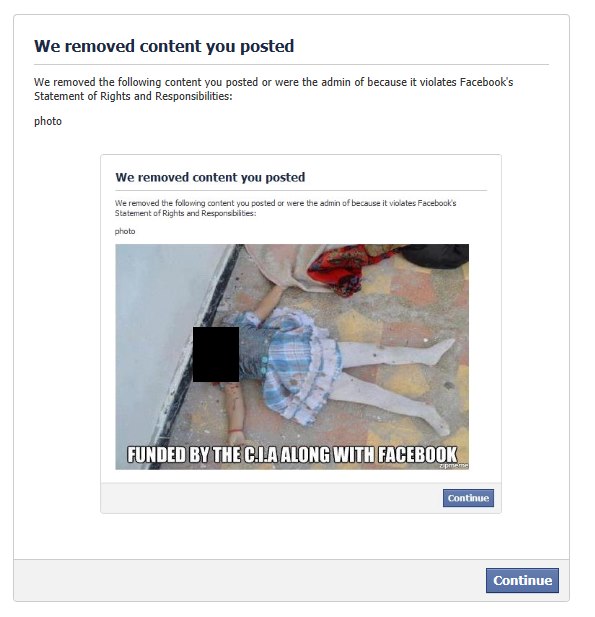
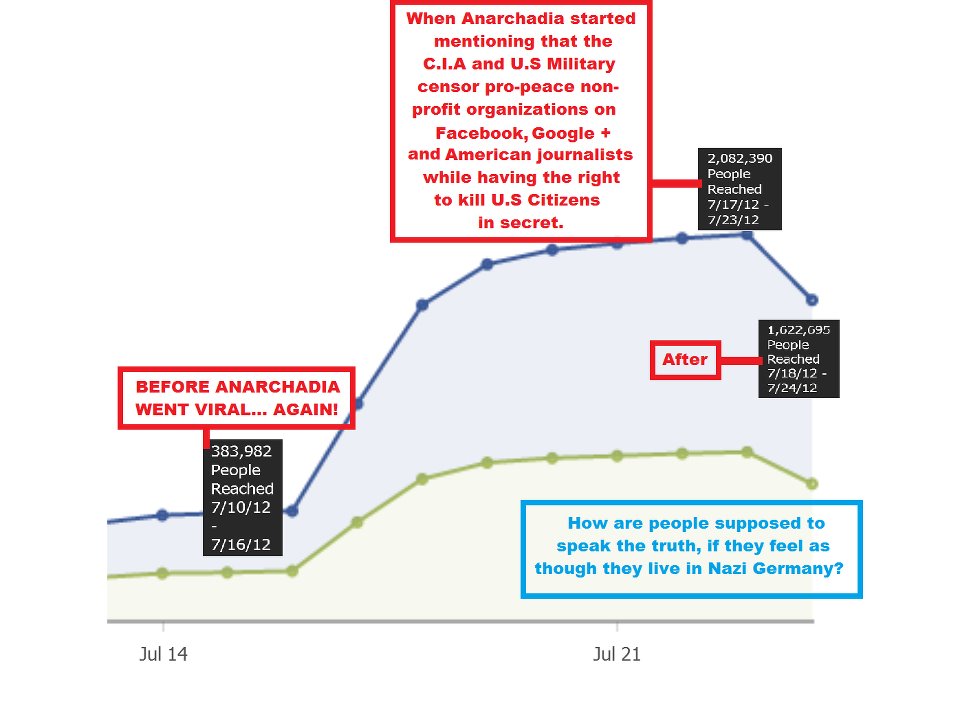
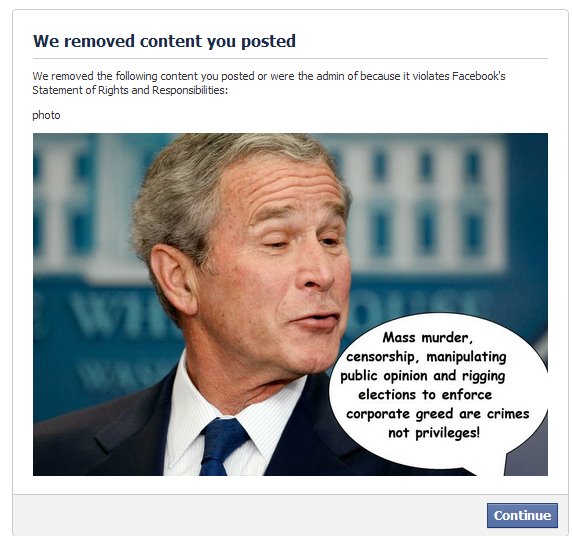
The newest estimate outstrips even the recent alarming warning by the United Nations Food and Agriculture Organization, which had noted a six percent increase over a similar time frame.

"Food prices rose again sharply threatening the health and well-being of millions of people," said bank President Jim Yong Kim. "Africa and the Middle East are particularly vulnerable, but so are people in other countries where the prices of grains have gone up abruptly."
Experts have assigned much of the blame to severe summer weather. A long drought has devastated wheat harvests across Eastern Europe, particularly in Kazakhstan, Russia and Ukraine. In the United States, the summer has been the hottest ever recorded since the National Oceanic and Atmospheric Administration began keeping records in 1895. Combined with a drought, the record heat turned what had originally been predicted to be a record high corn harvest into the smallest since 2003. U.S. soybean crops have also been devastated.
The World Bank also blamed U.S. ethanol production, which consumes 40 percent of the country's corn crop, for record high corn prices.

"Historic" increases threaten the world's poorest
According to the World Bank's report, corn and wheat prices increased 25 percent between June and July, and soybean prices increased by 17 percent over the same time period. The price of corn has actually doubled in the past two years, while the price of soybeans has doubled in the past five.
Rice was the only staple to show a decrease, with a price drop of four percent. The overall food price globally increased by six percent between July 2011 and July 2012, reaching a new record high over the prior peak of February 2011.
The World Bank warned that food-importing countries in Africa and the Middle East will be hardest hit by the price increases. Troublingly, these also tend to be countries where people spend a greater proportion of their income on food.
The price of corn has already increased by 113 percent in Mozambique in the past three months. In South Sudan, the price of sorghum surged 220 percent in the same time period.
The Malawi Vulnerability Assessment Committee has warned that 1.63 million people in that country will be unable to meet their food needs by March, now that a long drought has forced Malawi to import more of its food. The price of corn increased 174 percent in Malawi between July 2011 and July 2012. The World Bank has called for individual governments to increase food aid programs domestically.
"We cannot allow these historic price hikes to turn into a lifetime of perils as families take their children out of school and eat less nutritious food to compensate for the high prices," World Bank President Jim Yong Kim said.
Many nonprofits, in contrast, have called for richer countries to address the inequities of the global food system. Yet the G20 (a group of the world's foremost economies) has announced that it will take no action on the food crisis until after the U.S. Department of Agriculture releases its harvest estimates in September. This move was condemned by the hunger nonprofit Oxfam.
"This 'wait and see' attitude is unacceptable," said Oxfam spokesperson Colin Roche. "Oxfam is already seeing the devastating impact of food price volatility in developing countries that rely on food imports."
Analysts are unsure what will happen to food prices in the near future, as the upcoming El Nino weather event is just as likely to boost South American harvests as to devastate Australian ones.
Sources for this article include:
naturalnews.com
bbc.co.uk
latimesblogs.latimes.com
edition.cnn.com

Thanks to the available findings of a 2006 study showing that cannabis actually reduces the number of cancer cells, medical marijuana users can now feel even better about the widely abolished pain relief ingredient found in the plant. The relationship between marijuana and cancer has always been up for debate, but with the use of a specially crafted oil made from the buds of the Cannabis Sativa plant, scientists confirmed that the plant’s primary psychoactive chemical tetrahydrocannabinol (THC) destroys any and all malignant cancer cell growths in several patients. Details on the marijuana and cancer prevention connection aren’t exactly known, but further, more extensive testing will reveal exactly what may be causing this seemingly miracle cure.
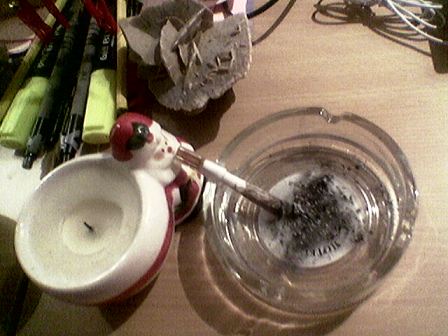
Shedding Some Light on the Marijuana and Cancer Relationship
Back in 2006, the study was developed by a team of medical researchers at the Virginia Commonwealth University’s Pharmacology and Toxicology department on leukemia patients. The researchers essentially outlined that if taken daily for an extended period of time, cannabis oil actually reverses the growth of cancer and possibly leads to remission in the patient – with zero added side effects. Typically when a leukemia patient enters a hospital for admission and treatment, they are given a very extensive chemotherapy treatment, usually paired with a radiological treatment. Instead of considering any possible treatment involving marijuana and cancer, doctors use these not only ineffective, but also dangerous treatments. Cannabis, on the other hand, as shown in the study, has virtually no side effects. It is especially safe and effective when administered in a clean, medically sound environment and in the form of oil.
Other studies have been made over the past decades much like this one: Manuel Guzman located in Madrid, Spain discovered that cannabinoids substantially inhibit the growth of tumors in a variety of lab animals. In the study he also found that not one of these tested animals endured any kind of side effects seen in many similar chemotherapy treatments. It is becoming increasingly clear that you can sidestep any of the misery associated with traditional cancer treatments and embrace the potent, effective healing powers of THC – not to forget about the positive attributes surrounding cannabis’ other primary cannabinoid, cannabidiol (CBD).

If the results don’t appeal to you, then maybe the 2,500 total studied patients throughout these 37 controlled studies will blow the lid on the myth that cannabis is and can only be used as a “dangerous” drug. None of the patients reported any kind of adverse side effects from the use of THC and based medication – further adding to the benefits of medical marijuana and strengthening the positive connection between marijuana and cancer.
The real irony in the situation here? The combined governments of the world are the primary authority behind more than 30 studies like these completed throughout the years – and kept them secret from the general public. It wouldn’t be very conducive for our government if word got out that a schedule 1 narcotic could actually help people.
Source: Natural Society - Author: Patrick Gallagher
Additional sources:
Global Healing Center
Healthier Talk
The Russia’s consumer-rights regulator Rospotrebnadzor asked scientists at the country’s Institute of Nutrition to review the study. The watchdog has also contacted to European Commission’s Directorate General for Health & Consumers to explain the EU’s position on GM corn.
The report prepared by France’s University of Caen and published last week, claimed that rats fed over a two-year period with Monsanto’s genetically modified NK603 corn, developed more tumors and other pathologies than a test group fed with regular corn. The NK603, sold under the Roundup label, is genetically engineered to withstand glyphosate weed killer.

The company criticized the study, saying it “doesn’t meet minimum acceptable standards for this type of scientific research” and the data was incomplete.
Monsanto also said Russia’s ban will have little effect on its business as the country import small volumes of corn from the US. Besides that, the Russian government doesn’t permit farmers to plant GM crops. “Russia is a net exporter of grain, so the actual impact of their temporary suspension, if any, is likely to be small,” the spokesman said in a statement.
Meanwhile, France announced it will uphold the ban on genetically modified crops in the country. It has asked the national food-security agency Anses to examine the study of Monsanto’s corn. If other countries follow the examples of Russia and France it could be a severe blow to the major US biotech.
In California, activists are fighting to have GM products removed from the food supply. They are also pushing to pass Proposition 37, a law that would legally require genetically modified foods to be labeled as such. Monsanto is opposing the law and it has donated over $4.2 million to lobby against it. Over 2,000 farmers have petitioned the US government to more thoroughly investigate the impacts of the genetically modified corn crop from Monsanto.
Source: trueactivist.com (September 26, 2012) via rt.com/business/news
The assertions were made by Libyan opposition figures arrested by the Americans and handed over to Col. Muammar Gaddafi in the middle of the last decade when Washington was seeking rapprochement with the late Libyan dictator.
They are contained in a report by Human Rights Watch, which interviewed 14 former prisoners after the fall of Col Gaddafi. Most belonged to the Libyan Islamic Fighting Group that had worked to overthrow him for 20 years.
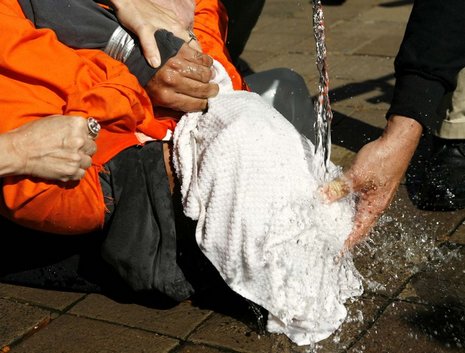
Two out of the men interviewed said they were submitted to interrogation tactics that match previous instances of waterboarding.
After his arrest in Peshawar, Pakistan in 2003, Mohammed al-Shoroeiya said he was flown for half an hour to a location he later came to believe was in Afghanistan.

He said he was placed on a board that could rotate through 360 degrees. After a hood was put over his face, he said, “They start to pour water to the point where you feel like you are suffocating.”
When asked how many times this was done to him, he said: “A lot …a lot … it happened many times …. They pour buckets of water all over you.”
Khalid al-Sharif, who was arrested along with al-Shoroeiya, said: They gave me a different type of torture every day. Sometimes they used water, sometimes not.… Sometimes they stripped me naked and sometimes they left me clothed.”
Now head of the Libyan National Guard, Mr Sharif claimed he was held for two years in two different US-run detention centres believed to be operated by the CIA in Afghanistan.
Both men have always disavowed al-Qaeda and were never accused of sympathising with the global terror group by the Americans.

Eric Holder, the US attorney general, announced that no one would be prosecuted for the deaths of a prisoner in Afghanistan in 2002 and another in Iraq in 2003. Photo: AP
Laura Pitter, counterterrorism advisor at Human Rights Watch and author of the report, said: “Not only did the US deliver Gaddafi his enemies on a silver platter but it seems the CIA tortured many of them first,” said:
“The scope of Bush administration abuse appears far broader than previously acknowledged and underscores the importance of opening up a full-scale inquiry into what happened.”
Human Rights Watch said the report demonstrated that Britain and numerous other countries were complicit in helping hand over Col Gaddafi’s opponents.
Intelligence documents discovered in Tripoli supported similar claims by Abdul Hakim Belhadj, leader of the LIFG who was a key figure in the overthrow of Col Gaddafi, and a deputy Sami Mostafa al-Saadi.
The US government has stated that only three senior al-Qaeda figures were submitted to waterboarding.
When he came into office in January 2009 President Barack Obama banned the practice and ordered an investigation into all so called harsh interrogation techniques. It recently concluded that CIA officials should be charged.
Last week Eric Holder, the US attorney general, announced that no one would be prosecuted for the deaths of a prisoner in Afghanistan in 2002 and another in Iraq in 2003.
Author: Alex Spillius, Diplomatic Correspondent - Source: telegraph.co.uk via weknowthesecretsofthefederalreserve.com
When testing the firm’s top brand weed killer the rats showed similar symptoms.
The French government has asked its health and safety agency to assess the study and had also sent it to the European Union's food safety agency, Reuters reports.

"Based on the conclusion…, the government will ask the European authorities to take all necessary measures to protect human and animal health, measures that could go as far as an emergency suspension of imports of NK603 maize in the European Union," the French health, environment and farm ministries said in a joint statement.
Researchers from the University of Caen found that rats fed on a diet containing NK603 – a seed variety made tolerant to amounts of Monsanto's Roundup weedkiller – or given water mixed with the product, at levels permitted in the United States – died earlier than those on a standard diet.
The research conducted by Gilles-Eric Seralini and his colleagues, said the rats suffered mammary tumors, as well as severe liver and kidney damage. The study was published in the journal of Food and Chemical Toxicology and presented at a news conference in London.
Fifty percent of male and 70 percent of female rats died prematurely, compared with only 30 percent and 20 percent in the control group, said the researchers.

Combination image of two pictures featuring rats with tumors after they were fed a diet of genetically modified (GM) maize produced by US chemical giant Monsanto (AFP Photo / Criigen)
Monsanto spokesman, Thomas Helscher, said the company would review the study thoroughly but stated that other scientific studies had proved the biotech crops’ safety.
Some scientists however criticized the French researchers’ statistical methods and the use of a particular type of rat, saying the albino Sprague-Dawley strain of animal had a tendency to develop cancers.
But despite skepticism, the study draws attention to controversy surrounding genetically modified crops and the US biotech giant Monsanto.
Michael Antoniou, a molecular biologist at King’s College London – who acted as an adviser to Seralini's team – told reporters that the study stresses the “need to test all GMO crops in two-year lifelong studies”.
“I feel this data is strong enough to withdraw the marketing approval for this variety of GMO maize temporarily, until this study is followed up and repeated with larger number of animals to get the full statistical power that we want,” he said as quoted by Reuters.
Last Friday France said it will uphold a ban on genetically modified crops produced by the Monsanto. The move came as President Francois Hollande pushed his plan to put the environment back at the top of the international agenda.
In the wake of the publication, Jose Bove, vice-chairman of the European Parliament’s commission for agriculture, called for an immediate suspension of all EU cultivation and import authorizations of genetically modified crops.
“This study finally shows we are right and that it is urgent to quickly review all GMO evaluation processes,” he said following the announcement of the research.
While being widely used in the United States, GMO crops have been less popular among European consumers, due to concerns about its impact on people’s health and the environment.
In California, opponents of genetically engineered food are fighting to have it removed from the food supply. They are also pushing to pass Proposition 37, a law that would legally require genetically modified foods to be labeled as such. Monsanto stands opposed to such a proposal and has donated over $4.2 million to lobby against it.
Agriculturalists across America have previously tried to take the biotech giant to court over charges stemming from their lab-made corn GMOs. Over 2,000 farmers have petitioned the US government to more thoroughly investigate the impact that genetically modified corn crop from Monsanto will have on the country.
As RT reported before, Monsanto wants to plant a corn variant across America’s Midwest that will be resistant to a powerful pesticide produced with 2,4-D, the same compound crucial to the make-up of the notorious Vietnam War-era killer Agent Orange. If approved, the new corn will be able to thrive as farmers douse their fields in the chemical, killing off unwanted weeds in the process, while at the same time subjecting Americans to a pesticide linked to cancer risks.
Source: RT.com - Published: 20 September, 2012
Launching a lawsuit against the very company that is responsible for a farmer suicide every 30 minutes, 5 million farmers are now suing Monsanto for as much as 6.2 billion euros (around 7.7 billion US dollars). The reason? As with many other cases, such as the ones that led certain farming regions to be known as the ‘suicide belt’, Monsanto has been reportedly taxing the farmers to financial shambles with ridiculous royalty charges. The farmers state that Monsanto has been unfairly gathering exorbitant profits each year on a global scale from “renewal” seed harvests, which are crops planted using seed from the previous year’s harvest.
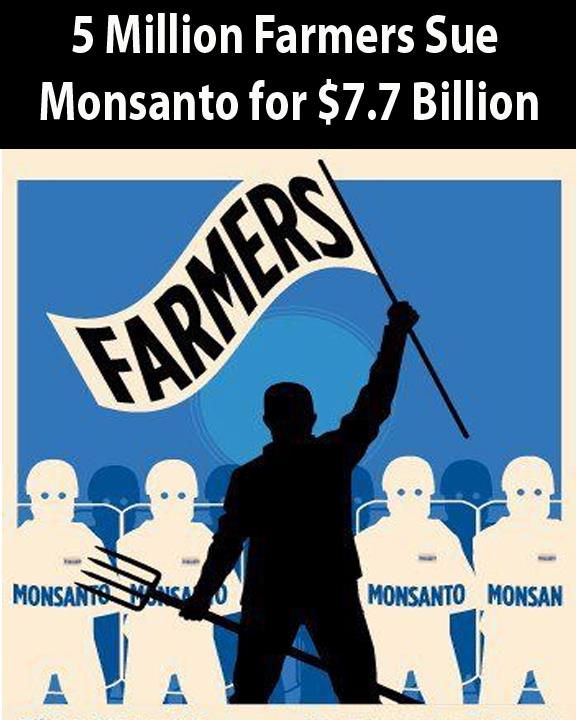
The practice of using renewal seeds dates back to ancient times, but Monsanto seeks to collect massive royalties and put an end to the practice. Why? Because Monsanto owns the very patent to the genetically modified seed, and is charging the farmers not only for the original crops, but the later harvests as well. Eventually, the royalties compound and many farmers begin to struggle with even keeping their farm afloat. It is for this reason that India slammed Monsanto with groundbreaking ‘biopiracy’ charges in an effort to stop Monsanto from ‘patenting life’.
Jane Berwanger, a lawyer for the farmers who went on record regarding the case, told the Associated Press:
“Monsanto gets paid when it sell the seeds. The law gives producers the right to multiply the seeds they buy and nowhere in the world is there a requirement to pay (again). Producers are in effect paying a private tax on production.”
The findings echo what thousands of farmers have experienced in particularly poor nations, where many of the farmers are unable to stand up to Monsanto. Back in 2008, the Daily Mail covered what is known as the ‘GM Genocide’, which is responsible for taking the lives of over 17,683 Indian farmers in 2009 alone. After finding that their harvests were failing and they started to enter economic turmoil, the farmers began ending their own lives — oftentimes drinking the very same insecticide that Monsanto provided them with.
As the information continues to surface on Monsanto’s crimes, further lawsuits will begin to take effect. After it was ousted in January that Monsanto was running illegal ‘slave-like’ working rings, more individuals became aware of just how seriously Monsanto seems to disregard their workers — so why would they care for the health of their consumers? In April, another group of farmers sued Monsanto for ‘knowingly poisoning’ workers and causing ‘devastating birth defects’.
Will endless lawsuits from millions of seriously affected individuals be the end of Monsanto?
Source: naturalsociety.com - Author: Anthony Gucciardi (June 5, 2012)
Al Haq's new report provides more evidence. Titled "Pillage of the Dead Sea: Israel's Unlawful Exploitation of Natural Resources in the Occupied Palestinian Territory," it details grand theft and war crimes. They benefit Jews by harming Palestinians. More on it below.
Yesh Din defends Palestinian human rights. It exposes Israeli abuses. It champions long denied accountability.
In March 2009, it petitioned Israel's High Court of Justice (HCJ). It wants lawless West Bank mining operations stopped. Israel and 11 Israeli corporations steal Palestinian resources rightfully theirs. It demanded all quarrying and mining activities cease.

It argued that Israeli companies pillage Palestinian resources for profit and Israel's benefit. Doing so also violates fundamental international law. As an occupying power, Israel is obligated to protect, not exploit, Palestinian rights.
On December 26, 2011, the HCJ rejected Yesh Din's petition. It sanctioned lawless pillage. On January 10, 2012, Yesh Din requested another hearing before a broader panel of judges.
Seven distinguished Israeli legal experts stood with Yesh Din. They took issue with the Court's ruling. Their collective opinion matters. It provides greater impact.
On July 25, 2012, the HCJ spurned Yesh Din again. In his decision, retired Deputy President Judge Eliezer Rivlin said the December 2011 ruling rejected Yesh Din's petition mainly because Israel and the Palestinian Authority addressed the issue earlier. They agreed to an interim 1995 deal.
He failed to explain its terms. It explicitly said "quarries must be transferred to the Palestinian side within 18 months." Israel still controls them. The Court's ruling OK'd its right to steal.

Seven leading international law experts disagree. They unequivocally call Israel's mining operations lawless. In their judgment, the Court's ruling was troublesome. Judge Rivlin addressed their opinion, saying:
"I did not ignore the opinion of the experts on international law submitted in support of the petitioner's argument. The learned opinion raises important questions and analyzes them most skillfully and eruditely."
"However, in the concrete circumstances of this case, since no precedent was set in the decision that would justify a further hearing, there is no need to discuss them at this stage."
In response, Yesh Din attorney Shlomy Zachary said:
"This decision by the High Court of Justice recognizes the serious flaws of the court's decision on the original petition, and mutes its conclusions."
"The court is also aware that the decision's determinations must be decided in the future, and therefore the decision on the concrete matter cannot serve as a binding precedent."
"The opinion of the leading experts from Israel's universities, submitted as part of this case, added another level that reinforced the need to minimize the determinations about this matter, and we welcome that."
Israel's High Court tried having it both ways. In initially rejecting Yesh Din's petition, HCJ President Dorit Beinisch said:
"The belligerent occupation of Israel in the area has some unique characteristics, primarily the duration of the occupation period that requires the adjustment of the law to the reality on the ground, which imposes a duty upon Israel to ensure normal life for a period, which…is certainly long-term."
At the same time, the Court spurned international law. It also dismissed the opinion of seven distinguished Israeli legal experts.
Their judgment is indisputable. Rule of law principles back it. It carries weight. It concluded saying "the license granted to Israeli corporations to mine exhaustible natural minerals in territory under belligerent occupation is illegal."
High Court judges know it but ignored them and fundamental international law anyway. Their ruling was not only dishonest, it was convoluted.
Outrageously, the Court said militarized occupation and Israeli Civil Administration operations benefit Palestinians. In other words, controlling them at the point of a gun and pillaging their resources helps. How, the Court didn't explain. It merely said:
"Royalties paid to the Civil Administration by the operators of the quarries are used to finance the operations of the military administration, which promotes various kinds of projects aimed to benefit the interests of the area."
Stealing what's theirs doesn't help. Military occupation spurns their rights. Employment for small numbers of Palestinians at slave wages neither benefits them or the collective population.
Virtually all resources mined help Israel and its settlements. Mining fees, levies, and royalties flow straight to Israeli state coffers. Palestinians are denied what's rightfully theirs.
Al Haq's report offers more proof. Black's Law Dictionary calls pillage "the forcible taking of private property by an invading or conquering army from the enemy's subjects."
The 1907 Hague Regulations, Fourth Geneva, and other international laws prohibit doing so under all circumstances. The Statute of International Criminal Court calls "pillaging a town or place, even when taken by assault," a war crime.
Various military manuals prohibit pillage/plunder. The UN and other international organizations condemn it. Looting is absolutely forbidden. It's punishable under international, military, and general statute laws.
Israel spurns rule of law principles in all forms. Al Haq calls exploiting West Bank resources "the war crime of pillage." Its report examines Israeli Dead Sea area operations.
It's "prohibited from exploiting them in a way that undermines their capital and results in economic benefits for Israeli citizens, including settlers, or for its national economy."
The Dead Sea borders Jordan and Israel to the east and the West Bank to the west. It's in the Jordan Rift Valley. It lies over 400 meters below sea level.
It's 67 km long, 377 meters deep, and 18 km across at its widest point. With 33.7% salinity, it's one of the world's saltiest water bodies.
In 1967, Israel seized control. Jordan previously controlled the area. Oslo granted Israel military and administrative control. Vast land areas became closed military zones. Palestinians are denied entry to land rightfully theirs.
Since 1967, pillage accompanied occupation. Palestinians were dispossessed from their own land and resources. Israel stole and exploited the Dead Sea and surrounding areas by declaring them "State land." No legal basis whatever permits doing so.
Numerous military orders violate international law. It's been twisted, inverted, manipulated, distorted, undermined, and spurned to justify the unjustifiable.
Israel invents its own version of reality. Orwellian doublespeak defines it. Fundamental occupying power obligations are violated. State authorities and settlers reap benefits.
At the same time, unsustainable water extraction and mining methods let water levels decrease significantly.
Ahava Dead Sea Laboratories was licensed to steal. It mines Dead Sea mud. It's used for company products. Al Haq's General Director, Shawan Jabarin, said:
"The Israeli authorities are denying Palestinians access to their natural resources all across the OPT, but this practice is particularly evident in the occupied Dead Sea area. This also clearly demonstrates how Israel is benefiting economically from the occupation."
"Given that the settlers in the area and Ahava Dead Sea Laboratories directly profit from the appropriation of the Dead Sea natural resources and from the trade of the products extracted and processed in this region, they should be considered as primary perpetrators of the war crime of pillage."
Consumers have a right to know that Ahava operates illegally. Its products use stolen Palestinian resources. Doing so costs them nearly $150 million annually.
Ahava's based in Mitzpe Shalem settlement. It lies on the Dead Sea's western shore. It's Israel's only company licensed to mine area mud, silt, sand, gravel, and other minerals.
It operates subsidiaries in America, Britain and Germany. Its products have unique cosmetic qualities. They're used for various skin disorders. Exports provide about 60% of its revenue. The remaining 40% comes from Israel and tourism.
The Dead Sea has unique geographical, mineral, climatic, and archeological features. Its natural resource riches include ground and surface water, springs, and minerals. It's a potential world heritage site.
Its landscapes are stunning. Its climate is mild. Its potential for economic development is significant. Its tourism, industry, and agriculture thrive.
Israeli development plans include hotels, water parks, shopping malls, and urban facilities. Enhanced mineral and water extraction are also planned. Palestinians are entirely deprived of what's rightfully theirs.
The area is also environmentally vulnerable. Its ecosystem is endangered. At issue is over-extraction and other abuses. The Jordan River Basin's water system is affected. Large sinkholes emerged. As many as 3,000 exist. Dead Sea shrinkage is worrisome. It's divided into two lakes.
Upstream water diversion projects and southern Dead Sea mining caused serious sea level erosion. Over-exploitation is destroying the area. Domestic, agricultural, and industrial wastewater flows directly into the Dead Sea. Surrounding land areas are affected.
In 2004, Ahava got illegal mining rights. Authority granting them must cease and desist. Third-party states must demand it. Pressuring Israel to stop violating international law is vital. Aiding and abetting lawlessness can't be tolerated.
Relations with Ahava and other Israeli companies profiteering from pillage must cease. Importing their products is illegal. Everything originating from settlements should be barred. Failure to do so constitutes complicity with grand theft and war crimes. Israel is a serial abuser.
Source: Mathaba - Author: analyst Stephen Lendman, who lives in Chicago, USA
|